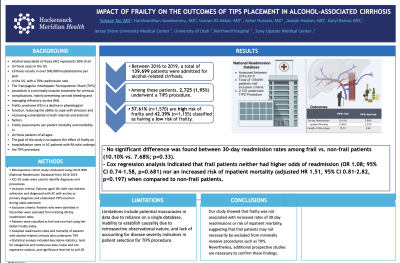Monday Poster Session
Category: Liver
P2406 - Frailty Does Not Impact the Outcomes of Transjugular Intrahepatic Portosystemic Shunt Placement in Alcohol-related Cirrhosis
Monday, October 23, 2023
10:30 AM - 4:15 PM PT
Location: Exhibit Hall

Has Audio

Sobaan Taj, MD
Hackensack Meridian Jersey Shore University Medical Center
Neptune, NJ
Presenting Author(s)
Sobaan Taj, MD1, Harshavardhan Sanekommu, MD2, Usman Ali Akbar, MD3, Azhar Hussain, MD4, Ndausung Udongwo, MD5, Henna Pervaiz, MD6, Viraaj Pannu, MD5, Saira Chaughtai, MD2, Joseph Heaton, MD5, Daryl Ramai, MD, MSc7
1Hackensack Meridian Jersey Shore University Medical Center, Neptune, NJ; 2Jersey Shore University Medical Center, Woodbridge, NJ; 3North Shore University Hospital, Neptune, NJ; 4SUNY Upstate Medical University, New York, Syracuse, NY; 5Jersey Shore University Medical Center, Neptune, NJ; 6SUNY Downstate Medical Center, Brooklyn, NJ; 7University of Utah, Salt Lake City, UT
Introduction: Transjugular Intrahepatic Portosystemic Shunt (TIPS) has been shown to improve liver-transplantation-free survival in cirrhotic patients with recurrent ascites. Frailty is a clinical syndrome linked to poor outcomes in hospitalized patients, characterized by reduced physiological reserve to handle stressors. We aimed to investigate the impact of frailty on TIPS utilization, inpatient mortality, and the rate of 30-day readmission in patients with alcohol-related cirrhosis (AC).
Methods: A retrospective cohort study using the Nationwide Readmission Database from 2016-2019 was conducted using the International Classification of Diseases 10th code to identify patients admitted with AC with ascites. Patients were classified as frail and non-frail using the Gilbert Frailty Index. The impact of frailty on TIPS utilization, inpatient mortality, and 30-day readmission was analyzed using descriptive statistics and multivariate regression models. A p-value < 0.05 was considered statistically significant.
Results: Between 2016 and 2019, 139,699 individuals were admitted for AC. Of these, 2,725 (1.95%) underwent a TIPS procedure, and 57.61% (n=1,570) were classified as frail. No significant difference was found between 30-day readmission rates among frail vs. non-frail patients (10.10% vs. 7.68%; p=0.33). Regression modeling indicated that frail patients neither had higher odds of readmission (OR 1.08; 95% CI 0.74–1.58, p=0.681) nor an increased risk of inpatient mortality (adjusted HR 1.51, 95% CI 0.81-2.82, p=0.197), compared to non-frail patients.
Discussion: This study suggests that frailty doesn't increase the risk of inpatient mortality or 30-day readmissions, indicating that frail patients may not be excluded from minimally invasive procedures like TIPS. However, further prospective studies are required to confirm these results.

Disclosures:
Sobaan Taj, MD1, Harshavardhan Sanekommu, MD2, Usman Ali Akbar, MD3, Azhar Hussain, MD4, Ndausung Udongwo, MD5, Henna Pervaiz, MD6, Viraaj Pannu, MD5, Saira Chaughtai, MD2, Joseph Heaton, MD5, Daryl Ramai, MD, MSc7. P2406 - Frailty Does Not Impact the Outcomes of Transjugular Intrahepatic Portosystemic Shunt Placement in Alcohol-related Cirrhosis, ACG 2023 Annual Scientific Meeting Abstracts. Vancouver, BC, Canada: American College of Gastroenterology.
1Hackensack Meridian Jersey Shore University Medical Center, Neptune, NJ; 2Jersey Shore University Medical Center, Woodbridge, NJ; 3North Shore University Hospital, Neptune, NJ; 4SUNY Upstate Medical University, New York, Syracuse, NY; 5Jersey Shore University Medical Center, Neptune, NJ; 6SUNY Downstate Medical Center, Brooklyn, NJ; 7University of Utah, Salt Lake City, UT
Introduction: Transjugular Intrahepatic Portosystemic Shunt (TIPS) has been shown to improve liver-transplantation-free survival in cirrhotic patients with recurrent ascites. Frailty is a clinical syndrome linked to poor outcomes in hospitalized patients, characterized by reduced physiological reserve to handle stressors. We aimed to investigate the impact of frailty on TIPS utilization, inpatient mortality, and the rate of 30-day readmission in patients with alcohol-related cirrhosis (AC).
Methods: A retrospective cohort study using the Nationwide Readmission Database from 2016-2019 was conducted using the International Classification of Diseases 10th code to identify patients admitted with AC with ascites. Patients were classified as frail and non-frail using the Gilbert Frailty Index. The impact of frailty on TIPS utilization, inpatient mortality, and 30-day readmission was analyzed using descriptive statistics and multivariate regression models. A p-value < 0.05 was considered statistically significant.
Results: Between 2016 and 2019, 139,699 individuals were admitted for AC. Of these, 2,725 (1.95%) underwent a TIPS procedure, and 57.61% (n=1,570) were classified as frail. No significant difference was found between 30-day readmission rates among frail vs. non-frail patients (10.10% vs. 7.68%; p=0.33). Regression modeling indicated that frail patients neither had higher odds of readmission (OR 1.08; 95% CI 0.74–1.58, p=0.681) nor an increased risk of inpatient mortality (adjusted HR 1.51, 95% CI 0.81-2.82, p=0.197), compared to non-frail patients.
Discussion: This study suggests that frailty doesn't increase the risk of inpatient mortality or 30-day readmissions, indicating that frail patients may not be excluded from minimally invasive procedures like TIPS. However, further prospective studies are required to confirm these results.

Figure: Captions are mentioned in the picture.
Disclosures:
Sobaan Taj indicated no relevant financial relationships.
Harshavardhan Sanekommu indicated no relevant financial relationships.
Usman Ali Akbar indicated no relevant financial relationships.
Azhar Hussain indicated no relevant financial relationships.
Ndausung Udongwo indicated no relevant financial relationships.
Henna Pervaiz indicated no relevant financial relationships.
Viraaj Pannu indicated no relevant financial relationships.
Saira Chaughtai indicated no relevant financial relationships.
Joseph Heaton indicated no relevant financial relationships.
Daryl Ramai indicated no relevant financial relationships.
Sobaan Taj, MD1, Harshavardhan Sanekommu, MD2, Usman Ali Akbar, MD3, Azhar Hussain, MD4, Ndausung Udongwo, MD5, Henna Pervaiz, MD6, Viraaj Pannu, MD5, Saira Chaughtai, MD2, Joseph Heaton, MD5, Daryl Ramai, MD, MSc7. P2406 - Frailty Does Not Impact the Outcomes of Transjugular Intrahepatic Portosystemic Shunt Placement in Alcohol-related Cirrhosis, ACG 2023 Annual Scientific Meeting Abstracts. Vancouver, BC, Canada: American College of Gastroenterology.
